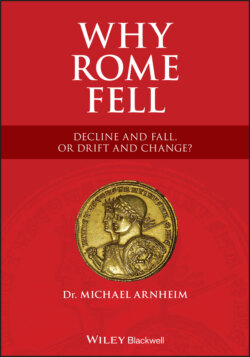Читать книгу Why Rome Fell - Michael Arnheim - Страница 27
The Gracchi Brothers
ОглавлениеIn 133 BCE, Tiberius Gracchus, a member of the patricio-plebeian aristocracy, plebeian on his father’s side and patrician on his mother’s, was elected tribune of the plebs and immediately introduced an ambitious program of land reform entailing redistribution of land from wealthy nobiles to the urban poor. Tiberius Gracchus’s attempt to run for re-election was opposed by conservative senators, and violence erupted resulting in the clubbing to death of Gracchus and some 300 of his supporters.
Ten years later, in 123 BCE, Tiberius Gracchus’s brother Gaius Gracchus was also elected tribune of the plebs and attempted to revive his late brother’s program plus further measures to curb the power of the senatorial oligarchy. He had a broad base of support, made up not only of the urban poor but also of the agrarian poor and even some equites (equestrians, the wealthy class just below that of senator). However, his bid to extend Roman citizenship to non-Roman Italians cost him the support of a substantial number of the Roman urban poor, who were unwilling to share the privilege of Roman citizenship with outsiders. When Gaius Gracchus was defeated for re-election to the tribunate, there was a mass rally of his supporters on the Aventine Hill. The Senate declared a state of emergency by passing what is now termed a senatus consultum ultimum, and the pro-senatorial consul Lucius Opimius at the head of a force of armed supporters defeated Gaius Gracchus and his followers in a pitched battle. Gracchus committed suicide, and approximately 3,000 of his supporters were put to death in the proscriptions that followed.
